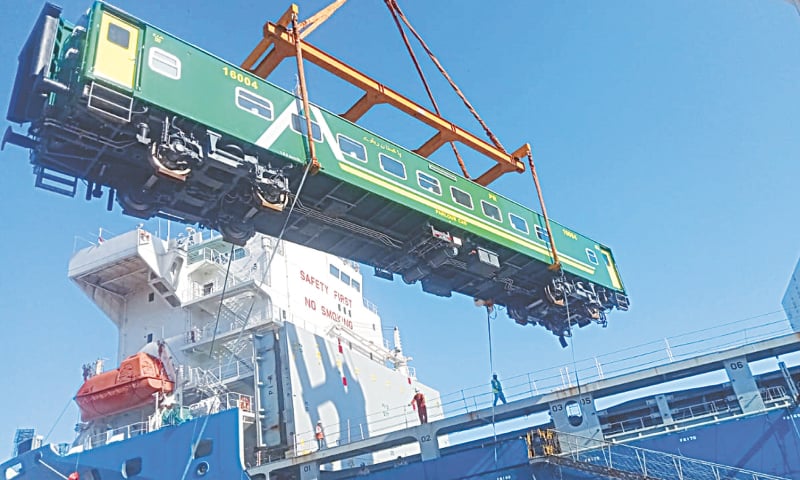KARACHI/LAHORE: Pakistan Railways (PR) has received a consignment of 46 high-speed modern coaches from China, paving the way for provision of state-of-the-art travelling facilities to the masses in the country.
After receipt of 46 completely built units (CBUs) manufactured in China, PR is set to soon start manufacturing 184 similar coaches (passenger, luggage and brake vans) at its carriage factory in Islamabad in association with Chinese engineers under the technology-transfer component of the 230 coaches’ purchase contract.
Similarly, Pakistan Railways would soon receive various consignments of 200 modern goods/freight wagons from China, and after receipt of these wagons, it would start manufacturing 620 wagons of similar designs at its Mughalpura workshop and the carriage factory in Risalpur under the technology-transfer segment of the contract. It was one year ago, in November 2021, when looking to upgrade and enhance long-distance passenger services in the country, the federal government had inked an agreement with China Railway Construction Corporation Tangshan Locomotive and Rolling Stock Company for the supply of 230 high-speed coaches for PR.
“We have received 46 new coaches comprising economy, AC standard and AC parlour classes for passengers and luggage and brake vans. The ship carrying them from China reached the Karachi Port on Saturday night. At present, the unloading of the coaches is under way at the port,” PR’s additional general manager (mechanical) Shahid Aziz told Dawn on Sunday. “The unloading of the coaches would take three days,” he said.
Talking about arrival of the coaches in Lahore, Mr Aziz said before this, the PR officers concerned would carry out test-run of the coaches on the Main Line-1 (ML-1) starting from Karachi to Peshawar via Rohri, Sukkar, Bahawalpur, Khanewal, Lahore and Rawalpindi. And after completion of the test-run, the commercial use of these coaches would begin by using them for various express passenger trains, he said.
According to the PR’s Chief Mechanical Engineer (CME), Abdul Haseeb, the coaches after unloading would be brought first to Karachi Cantt Railway Station through the railway line connected with the Karachi Port. After arrival of the coaches at Karachi Cantt Railway Station, their test-run would begin from Karachi to Peshawar.
“Once we complete the test-run, which includes several electrical and mechanical checks, the coaches would be despatched to Lahore. We will start using them for the Greenline express train which is likely to resume operation from Dec 15. The train operation had been suspended for Sindh and Balochistan in August this year due to floods,” he said.
In reply to a question, Mr Haseeb said PR was likely to receive various batches of 200 new freight/goods’ wagons from China soon as these would be despatched by the Chinese company next month.
“At present, the manufacturing of wagons is under way in China. But its pace is slow these days due to Covid-19-related restrictions there,” he added. He said under the technology transfer agreement, 184 coaches and 630 wagons are to be manufactured in Pakistan in collaboration with the Chinese experts.
The modern train coaches can run with speed of 160km per hour. The PR teams, under the technology transfer agreement, visited China in August during which they inspected prototypes of coaches and high-capacity wagons.
The PR teams consisted of 18 officials for design inspections, 20 for inspections and others for participating in the training related to transfer of technology.
Under a $140m contract, the Chinese company is supposed to manufacture 230 state-of-the-art coaches, of which 46 were manufactured in China and shipped to Pakistan during first week of the ongoing month.
The remaining 184 will be manufactured in Pakistan by the PR engineers and technical staff under the supervision of the Chinese experts.
Under another similar nature contract, a Chinese firm is supposed to manufacture 800 freight wagons and 20 brake wagons (total 820). Of these 820 wagons, 200 will be provided to PR while the rest would be manufactured in Pakistan.
Imran Ayub in Karachi also contributed to this report
Published in Dawn, November 28th, 2022














































